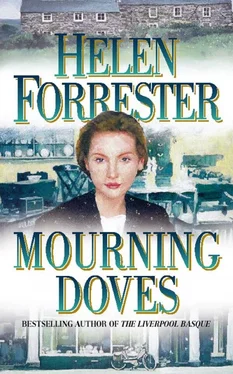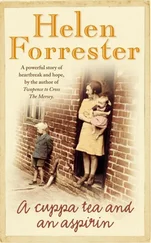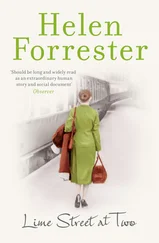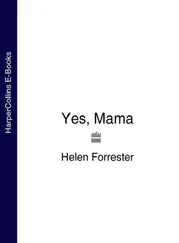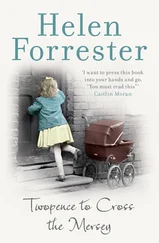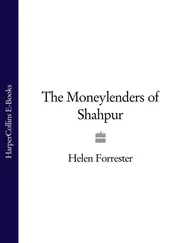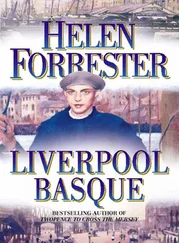Before leaving the kitchen, Celia turned and gave the cook a quick hug. ‘I don’t know what we’re going to do without you,’ she said.
Winnie forced a smile, and wondered what she was going to do without the Gilmore family, whom she had served for over fifteen years. All through the war, I stayed with them, she considered dolefully, when I could have earned much more in a munitions factory – I was proper stupid. I could have saved something to help me now.
A bell in the corner of the kitchen rang, and she turned to see which one it was. ‘Your mam’s awake,’ she shouted after Celia, who was running up the kitchen stairs. ‘Will you tell me when she’s ready for her breakfast?’
‘I will.’
As Celia went up the second staircase to her mother’s bedroom, she smiled slightly. Things were already changing. Winnie would never have referred to her mother as ‘your mam’ if her father had been alive; and, at the sound of the bell, Dorothy would have had to climb the two staircases to inquire directly what it was that Madam required.
Considering her flood of tears the previous night, Louise managed a remarkably solid breakfast. Celia, who did not want any, sat on the bed beside her, patiently wondering how to discuss their problems with her without causing yet another collapse into tears.
Finally, Louise laid her empty cup down on its saucer, and sighed. ‘Put the tray on the side table for me, dear,’ she ordered.
Celia did as she was bidden, while Louise crossed her hands over her stomach and stared disconsolately out of the window at a fine March day. She took no notice when Celia pulled out of her skirt pocket the list she had made earlier.
‘Mother,’ she said tentatively, ‘because Cousin Albert thinks we may have to move quickly from here, I’ve made a rough list of what I think we must do at once.’
Her mother turned to look at her, her pale, slightly protruding blue eyes showing no sign of tears. There was, however, a total absence of expression in them, and Celia wondered if her mother was feeling the same sense of unreality that she was, as if she were a long way off from what was happening, that this wasn’t her life at all; she was merely watching a play.
‘Yes, dear?’ Louise’s voice was quite calm, though she sounded weary.
Celia gathered her wandering thoughts, and began by saying, ‘I thought we’d better see, first, how much money we have access to.’ She paused, feeling that it was vulgar to consider money when they had just been bereaved. But they had to live until the house was sold, so she added firmly, ‘I suppose that dear Papa gave you the housekeeping at the beginning of the month?’
Louise gave a sobbing sigh, and said, ‘Yes, dear. I hope I can make it last through the first week in April.’
‘Then there’s the cheque Mr Billings gave you yesterday. How do we get money for it? Do you know?’
‘Your dear father always paid it into my bank account, and when I wanted to pay for a special dress, or something, for either you or me – or gifts – personal things, I wrote a cheque. I’m sure Mr Carruthers would show us how to put Mr Billings’ cheque into my account.’
‘Is there anything in the account at present?’
‘I don’t think so, dear. Your dear father got me to write a cheque on it for him about three months ago. It was a loan.’
Celia felt an uncomfortable qualm in her stomach at this disclosure. She wondered what else her father might have done, which would further imperil their limited finances. She suggested that if Louise felt strong enough they should pay a call on the bank that afternoon, to which Louise agreed.
‘Did Papa have a solicitor for his affairs, Mama?’
‘Well, he had Mr Barnett, of course, who came to the funeral, dear. As far as I know, he did any legal work in connection with your father’s business. He’s supposed to be supervising the sale of this house, remember?’ Louise moved restlessly in her bed. ‘But Father didn’t use his services very much, because he was expensive. He even wrote his will himself; but Cousin Albert says that it is perfectly valid. He said it was witnessed by Andy McDougall and his chief clerk.’
Celia knew of old Mr McDougall. When he had attended the funeral, he had looked as ferocious as his reputation held him to be, and with him there had been another old gentleman, who could well have been his chief clerk. She recollected vaguely that he was a corn merchant and had a small office, similar to her father’s, in the same building. She had noticed Cousin Albert talking with them after the funeral, probably because, as Albert had told her, he needed, first, to satisfy himself of the authenticity of the witnesses’ signatures to the will.
‘Do we need a solicitor, Celia?’ The question held a hint of anxiety in it.
Celia chewed her lower lip. ‘I don’t really know, Mama,’ she confessed. ‘But this house belongs to you – and it’s a handsome house – it must be worth quite a lot.’ How could she say that she did not trust her father’s cousin very much – she had no real reason to feel like this, except that he was being very domineering and he had apparently tried to collect the rents which Mr Billings had refused to hand over to him.
She said slowly, ‘I think that you should have a legal man to make sure that you receive what is yours.’
Her mother gave a small shocked gasp, and Celia hastily added, ‘Well, laws are funny things, and it is difficult for us to know what we are signing – we can read it – but understanding is something different. Did you understand the papers that you signed for Mr Barnett and the estate agent the other day?’
Louise was frightened. ‘Not really; they both said they gave them permission to sell the house and for the agent to charge me a commission for doing it. Should I have had a solicitor of my own? Albert said I should sign – and he was once a solicitor himself.’ She looked helplessly up at Celia.
‘Try not to worry, Mama. The papers probably are all right.’ How could she say to her mother that it was Albert Gilmore himself about whom she felt doubtful? She finally replied carefully, ‘I know he was a solicitor. But he’s looking after the will – which is Father’s affair. You don’t have anybody. Perhaps there should be someone who is interested only in your affairs.’
‘Yes, dear. I see.’ Louise was trembling with apprehension as she began slowly to get out of bed. Her huge, lace-trimmed cotton nightgown caught in the bedclothes, and momentarily a fine pair of snow-white legs were exposed to the spring sunlight pouring through the windows.
She hastily hitched her gown more modestly round her, but not before Celia had the sudden realisation that, though her mother always appeared old to her and her face petulant, she was extremely well preserved, with a perfect skin and luxuriant hair.
She might marry again. And, if she did, where would I be? she asked herself fearfully.
She swallowed hard. She had enough to worry about without anything else.
She said carefully, as she moved out of Louise’s way, ‘Perhaps Mr Carruthers at the bank could recommend a solicitor to us. We could ask him.’
As Louise nodded agreement, they both heard the front door bell faintly tinkling in the kitchen.
‘I think that will be Phyllis. She left her card yesterday when we were out, and said she would come again today. There are some cards on the tray for you, too. Will you be all right, Mother, if I go down? We could walk round to the bank this afternoon. Phyllis won’t stay long.’
Louise was already on her way to the bathroom and in the distance they could hear Dorothy running across the hall to answer the front door. Over her shoulder, Louise agreed resignedly, and then said in a more normal voice, ‘Really, Phyllis should not be walking out in her condition.’
Читать дальше
